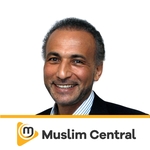Tariq Ramadan – Chronicles of Ramadan #16 Elderly and disabled people

AI: Summary ©
The speaker discusses the importance of acknowledging the negative impact of human society on society and the importance of showing respect towards disabled people. They emphasize the need to change this mindset and to focus on the spiritual meaning of life, rather than just money and work. The speaker also emphasizes the importance of providing attention and love to people who are neglected and need to be reconciled with human beings.
AI: Summary ©
Peace be with you.
We talked about
all these people who are around us and
that we have to pay attention to who
they are and what they are doing
because our societies today
are sometimes
helping us, pushing us to neglect people around
in our environment and are around us, and
we have to pay attention
to every single,
human being on earth.
And as we talked about the poor and
we talked about the exploited people, in our
modern societies, very often, we are quick to
neglect
the people who are the eldest
among us, the elder people who are not
active. They are part of what we call
passive
citizens within the society. They are not from
the active population,
and the way we look at them is
as if because they are not bringing money,
bringing
jobs and work within the community and the
society,
they are
helpless, and they are useless.
We have to change this, and this is
the way we have to repair
our understanding of what our societies are doing
with the
elders people.
That's a very important point in our tradition
the elder people within our society.
We need to show
respect and to dignify their presence because they
may not have
knowledge coming from books, but they have the
knowledge coming from life. These life experiences that
they have
should be respected for what the it is,
and this is a way the tradition is
kept in our societies. And it's exactly the
same that we,
should do with the disabled people within our
society. It's as if because
they are disabled, and they don't have all
their capacities
as we look at it
from a so called normal viewpoint,
that we are neglecting them because, once again,
they are not part of the active population.
And we look much more about profit and
money
much more than experience and much more,
about the spiritual meaning of the realities among
us because they are sending us a message.
Not only we have to thank god, to
thank Allah for who we are with our
age, with our situation,
with our body, but at the same times
we know that after thanking God for what
we have, we need to give to them
and pay attention
about to what they are and who they
are and what they need.
This is essential in our understanding of our,
living together within our societies.
And to get rid of this
capitalistic
mindset
and to come to the spiritual mindset saying,
as soon as there is life, you should
pay respect and attention, and you should give,
and especially
towards the people who within our societies
are neglected
and sometimes
really
not
dealt with with dignity
and,
humanity.
This is the way our spiritual teaching
are telling us to be with our brothers
and sisters
in humanity, and this is the only way
for our societies
to reconcile
itself
with
what means to be
dignified as human beings. Don't forget to tell
the people you love that you love them.
Life is fragile.